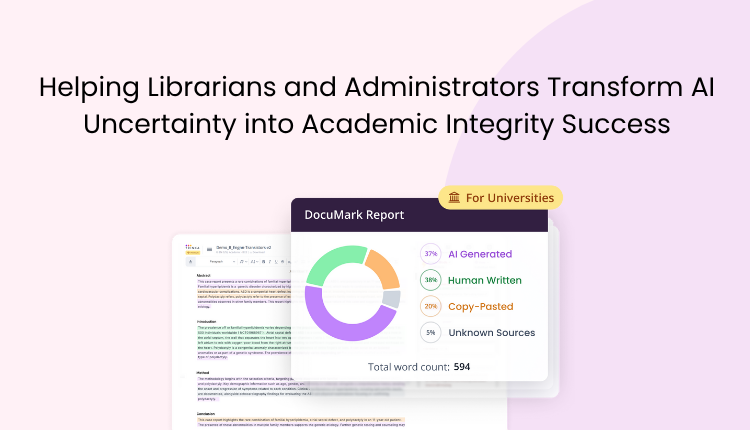Helping Librarians and Administrators Transform AI Uncertainty into Academic Integrity Success

The rise of generative AI tools in academia has sparked a major shift in higher education. While these technologies present exciting new possibilities for teaching, research, and learning, they also introduce complex challenges that require thoughtful, structured responses—not quick fixes.
For librarians and academic administrators, this shift calls for a proactive approach to academic integrity. By encouraging transparent authorship and responsible AI use, institutions can preserve their academic standards while still embracing innovation.
Understanding Today’s Academic Integrity Landscape
Around the world, universities are facing tough questions about the role of AI in student work. Faculty often spend hours trying to determine whether content is student-generated or created with AI—frequently using inconsistent detection tools that cause more confusion than clarity.
Meanwhile, students are left to navigate a patchwork of unclear AI policies that differ across departments, courses, and assignments. Many want to use these tools ethically but lack proper guidance, leading to stress and uncertainty about what is acceptable.
For administrators, the challenges go even deeper. They must ensure consistency in AI policy enforcement across programs, maintain fairness, and protect the credibility of academic credentials. These are responsibilities traditional integrity tools weren’t designed to handle.
Introducing DocuMark: From Detection to Transparency
DocuMark shifts the conversation from AI detection to authorship transparency. Instead of only flagging potential AI use, it enables students to log and disclose how they’ve used AI throughout their writing process. This gives faculty and administrators clearer insight into how AI has shaped student work—building trust, not suspicion.
Administrative Excellence Through Data-Driven Insights
DocuMark supports administrators in developing institution-wide integrity strategies. Rather than “policing” AI usage, it encourages openness, ethical behavior, and student accountability. As institutions revise honor codes and assessment models to reflect the age of AI, DocuMark provides a scalable solution for modern governance.
With real-time insights, administrators can:
-
Monitor AI policy compliance across departments
-
Spot trends in AI usage
-
Adjust policies based on actual data
-
Provide proof of compliance to accrediting bodies
Supporting Librarians and Educators with Consistent Integrity Practices
Librarians, long seen as academic integrity champions, are now helping students navigate an evolving AI-driven research landscape. With DocuMark, they have a powerful resource to guide students in ethical writing practices and responsible AI usage.
By ensuring a unified approach to writing guidelines across departments, DocuMark removes confusion caused by inconsistent course-level policies. Students benefit from clear standards, and institutions can foster fair, transparent academic practices.
Academic Integrity in the Age of AI
Traditional plagiarism tools often miss AI-generated content because it’s original in phrasing—even if not in thought. DocuMark closes this gap by classifying each sentence during writing as AI-generated, human-written, or pasted, offering full transparency into the writing process.
This detailed visibility:
-
Shows consistent or sudden changes in writing style
-
Highlights heavy AI use or unexplained text insertions
-
Tracks student writing progress over time
For thesis and dissertation supervision, this visibility supports mentoring, encourages reflection, and strengthens academic integrity. It shifts the conversation from suspicion to learning, helping students become AI-literate scholars who use technology responsibly.
Ensuring Fair, Transparent, and Defensible Assessments
With reputations and rankings on the line, universities can’t afford the fallout from academic misconduct. AI-written theses or ghostwritten work can severely damage credibility.
DocuMark safeguards against this by maintaining verifiable authorship records. In the event of appeals or allegations, its “writing replay” feature offers a transparent history of document creation—who wrote what, when, and how. This clarity helps resolve conflicts constructively and reinforces institutional credibility.
Most importantly, when students openly document their AI use, faculty can evaluate learning based on facts, not assumptions—creating a more just and transparent grading system.
Future-Proofing Academic Integrity
As AI becomes more embedded in academia, faculty, students, and administrators face new pressures. Librarians and academic leaders are essential in navigating these changes, but they need tools that go beyond detection.
DocuMark meets this need by embedding integrity, fairness, and accountability into every stage of the academic process. It supports policy implementation, student guidance, fair evaluation, and more—all while promoting a culture of trust and learning.
Ready to Transform Your Institution’s AI Strategy?
Trinka DocuMark is more than a detection tool—it’s a comprehensive framework for responsible AI integration in education.
Book a personalized demo to see how DocuMark can help your institution manage AI use, strengthen academic policies, and foster a transparent, forward-thinking learning environment.
Let me know if you’d like a shortened version for marketing or newsletter use!




